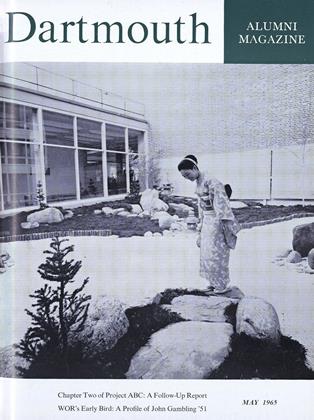By John Clark Pratt '54. Garden City,N. V.: Doubleday & Co., Inc., 1962. 400pp. $5.95.
"Where there is much desire to learn," wrote Milton, "there of necessity will be much arguing, much writing, many opinions." I recalled these words as I pondered John Clark's The Meaning of Modern Poetry, a book which intends, admirably, to help the unskilled reader to understand the ways of poetry. It is not the purpose, but the method, which may cause doubts.
The method can be briefly summarized as follows: no two pages of this book can be read consecutively, for each contains some comments about poetry and either asks some questions or answers a question that a previous page has asked. Where there are questions, the reader is given a choice of answers; when he selects one, he is directed to another page, where he will find out if he is right or wrong. If wrong, he is told why and referred back to his starting point to try again; if right, he is told why and sent to some other page for more commentary and questions.
Now all this is ingenious, and perhaps it will help a reader to develop a more sensitive response to poetry; but this reader must admit that the method left his head spinning, as in some mad game of Monopoly. Answering questions and flipping pages, the reader carries on a furious activity in which the game may well obscure the poetry, for after a few paragraphs of commentary, more questions are fired at him, and off he goes again. I suspect that most readers will feel little inclination to pause over difficult material; the questions are waiting to be answered, the game is there to be played, and one is understandably curious to see if he will be permitted to advance or forced to return to Go.
The most obvious danger of the method, both for reader and author, is oversimplification. The reader is asked to choose among answers that are either right or wrong, and he must choose the one right answer that will allow him to continue; where the complexities of poetry demand qualifications and subtle discriminations, or degrees of Tightness and wrongness, the method falters. Suppose the reader disagrees, or feels that he can defend his "wrong" answer? "If you still can't agree," the reader is advised on page 14, "then I suggest that you: (1) Burn the book and go through life thinking poetry is a waste of time. ... (2) Go on to page 12 anyway. ..." Either alternative, it seems to me, indicates that the method has failed, and both seem likely to leave the reader perplexed and frustrated.
A further problem of oversimplification results from the author's having to answer each question in 200 words or less; under such limitations, it is impossible to avoid distortion. The reader is told, for example, that poetry may be divided into two categories, dramatic and lyric. So many objections and qualifications come to mind that one must question the usefulness of the classification, and even the author is hesitant about offering it, for he concludes his discussion of the topic by saying, "Please accept these two terms for the purposes of this book." The method forces the author to ask for such favors, and I am not sure that the reader should be willing to grant them.
Finally I should point out that the title of this book is highly misleading in that "The Meaning of Modern Poetry" contains no poems by Eliot, Pound, Stevens, W. C. Williams, Crane, Lowell, or Eberhart, to name only the most prominent omissions, nor does it discuss the works of these poets. The book includes one poem each by Thomas, Auden, Cummings, Graves, Hardy, Frost, and Yeats.
Department of EnglishUniversity of Massachusetts
 View Full Issue
View Full Issue
More From This Issue
-
 Feature
FeatureCHAPTER TWO OF PROJECT ABC
May 1965 By CHARLES F. DEY '52, -
 Feature
FeatureWOR's Early Bird
May 1965 By HOWARD L. WEINBERG '62 -
 Feature
FeatureALUMNI COLLEGE '65
May 1965 -
 Feature
FeatureJAPANESE GARDEN
May 1965 -
 Article
ArticleWITH THE BIG GREEN TEAMS
May 1965 By ERNIE ROBERTS -
 Class Notes
Class Notes1940
May 1965 By ROBERT W. MACMILLEN, ROBERT H. LAKE
ROBERTS W. FRENCH '56
-
 Letters to the Editor
Letters to the EditorA Fluxus Ruckus
December 1992 -
 Article
ArticleWith the D.O.C.
May 1956 By ROBERTS W. FRENCH '56 -
 Feature
FeatureFIFTY YEARS OF THE DOC
February 1960 By ROBERTS W. FRENCH '56 -
 Books
BooksTHE QUARRY.
JUNE 1964 By ROBERTS W. FRENCH '56 -
 Books
BooksA YEAR AND A DAY.
OCTOBER 1964 By ROBERTS W. FRENCH '56 -
 Books
BooksWEATHERS AND EDGES.
OCTOBER 1966 By ROBERTS W. FRENCH '56
Books
-
 Books
Books"Size and Shape of Ocular Images I.
October 1932 -
 Books
Books1600 PENNSYLVANIA AVENUE.
July 1960 By FRANK SMALLWOOD '51 -
 Books
BooksMAS ALLA DEL HORIZONTE
July 1951 By R. Alberto Casas -
 Books
BooksCLINICAL ASPECTS AND TREATMENT OF SURGICAL INFECTIONS
March 1949 By Radford C. Tanzer '25. -
 Books
BooksISLAMIC CONTRIBUTIONS TO CIVILIZATION.
APRIL 1964 By ROBERT G. LANDEN -
 Books
BooksTALL TREES, TOUGH MEN.
MAY 1967 By ROBERT S. MONAHAN '29


